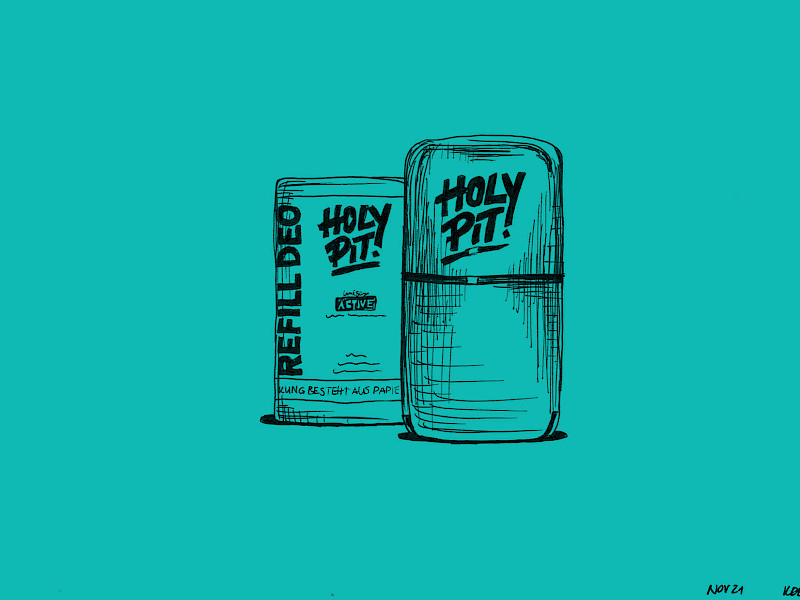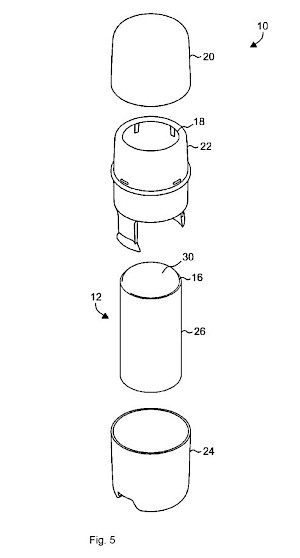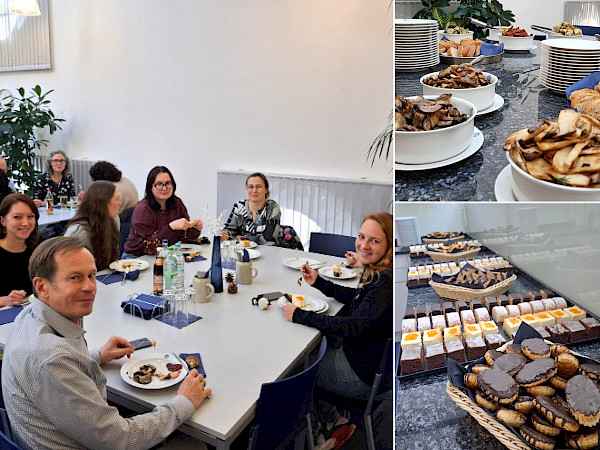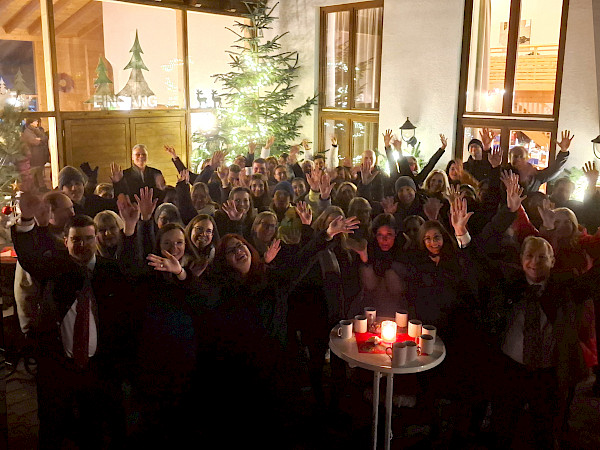Holy Pit – The smart refill deodorant
02.11.2021

The Shark Tank of Patents
In season 10, episode 4, of the TV show "Die Höhle der Löwen" (German version of the US show Shark Tank and the UK show Dragon's Den), the Holy Pit GmbH presents a refillable deodorant stick: a refill kit made of recycled plastic, in which the refill units are packaged in paper in an environmentally friendly way.
The product:
The Holy Pit Refill Deo.
What is it about?
The Holy Pit Refill Deo, which was presented to potential investors on "Die Höhle der Löwen", essentially consists of three plastic parts that work together and are made exclusively from recycled single-use plastic. The three plastic parts form the refillable Holy Pit Refill Deo. Refills are made using compostable paper cartridges.
The utility model
(Ref.: 20 2021 103 673.7)
In the utility model, the Holy Pit Refill Deo was protected as a body care or cosmetic stick. Claim 1, which basically determines the scope of protection for a product, is defined as follows (see Fig. 5 below):
A personal care or cosmetic stick (10) in which a body care or cosmetic composition (30) is disposed in an inner sleeve (12) and the inner sleeve (12) is disposed in an outer sleeve (20, 22, 24), characterized in that the inner sleeve (12) has a wall thickness in a range of 10 to 1200 µm.
At first glance, the scope of protection of claim 1 does not appear to differ from a lip balm in ordinary use.

Patent vs. utility model
Patents and the absolute novelty
In Germany, the concept of absolute novelty applies to patents. This means that inventions are only patentable if they were not known to the public at the time of the filing of the patent application.
A search using a Wayback Machine, a so-called Internet archive, revealed that the Holy Pit Refill Deo was already communicated on social media and on the Holy Pit homepage before the filing date, namely during the Kickstarter campaign for the deodorant: This started on 01.06.2021 and thus before the filing date (08.07.2021). So it can be clearly seen: The Holy Pit Refill Deo was publicly announced by Holy Pit itself before the filing date of the utility model.
It is no longer possible to grant a patent for an invention that has already been made public on social media or other communication channels. However, further developments of the Holy Pit Refill Deo would still be patentable - if they have not yet reached the public.
Utility model and the relative novelty
n Germany, the concept of relative novelty applies to utility models. This means that a publication going back to the applicant - within a grace period defined in the GebrMG - can be irrelevant. This so-called grace period gives the inventor the possibility to obtain an IP right even if the invention has been known to the public for a maximum of 6 months. Due to this, a utility model is often the last possibility for legal protection if the inventor has already made the invention public by their own announcement or action.
A search using the Wayback Machine did not reveal any release of the Holy Pit Refill Deo dated prior to January 8, 2021 (6 months prior to the filing date).
Consequently, a utility model could still be filed for the Holy Pit Refill Deo at that time.
Protective effect
Although the utility model is limited to Germany, it offers virtually the same protective effect as the patent. For this reason, the utility model is also referred to as "small patent". Thus, it applies - in the same way as for the patent - that it is prohibited for any third party to manufacture, offer for sale, put on the market or use a product which is the subject of the utility model in Germany, or to either import or possess it for the aforementioned purposes without the consent of the utility model owner (cf. §11 GebrMG).
Term and scope
of protection
The disadvantage of the utility model is that no protection can be obtained for a process and there is only a maximum protection period of 10 years from the filing date. The patent, on the other hand, can be granted for processes and offers protection for up to 20 years from the filing date.
Info: The patent thus offers protection for a wide range of inventions and can better guarantee medium-term success due to the longer protection period.
Unexamined property right
The utility model is an unexamined property right. Unlike patents, utility models are not examined for novelty and inventive step (which can take years), but become effective within a few weeks after a short formal examination by entry in a register. Utility models are therefore quick and easy to obtain compared to patents. However, even if utility models are not examined, the requirements for actually enforceable utility model protection are the same as for a patent, i.e. above all novelty and inventive step.
However, in the case of a utility model, these requirements are only examined upon request, e.g. upon request for cancellation or search request. Such a request for cancellation is usually filed at the latest when the utility model owner takes legal action against an imitator based on the utility model. As already indicated above, it may be found in such cancellation proceedings that claim 1 of the utility model relating to the product of the Holy Pit Refill deo does not meet these requirements. Then the utility model is cancelled and is legally considered invalid from the beginning.
In summary, the legal protection for the product Holy Pit Refill Deo is limited in time as well as in content due to the present utility model.
Conclusion
The success of an invention lies decisively in the strategic planning for its legal protection against imitations. In principle, the applicant should be aware of the markets in which they intend to operate in the medium to long term. In the case of the Holy Pit Refill Deo, imitators could at least pose a threat abroad, since in this case a protective right exists only for Germany. The fact that Holy Pit has deprived itself of the possibility of patent protection in Europe, USA, China and many other countries through its social media presence shows how important it is to consult an experienced patent attorney at an early stage in order to work out a customized IP strategy. In this way, not only can potential competitive disadvantages be avoided in advance, but significant competitive advantages can even be created.
In the case of the Holy Pit Refill Deo, a utility model was registered using the 6-month grace period. But in this case, a utility model is only a "stopgap", so to speak, because in addition to the shorter protection period of 10 years, it offers above all the uncertainty of its legal validity, since no examination for novelty and inventive step takes place during registration. We therefore recommend such a utility model application instead of a patent application only in an exceptional cases such as the Holy Pit Deo.
Disclaimer: The above contribution reflects the personal opinion of the author. The assessments and statements made in the article do not constitute legal advice and are provided under exclusion of any liability. If you need an assessment of an individual case, please contact the author and/or the law firm KUHNEN & WACKER.
Further news and
publications from K&W

Start Your Career at K&W
and Become Part of Our Team
Are you ambitious and flexible? Do you like to work independently and are prepared to take responsibility? If so, K&W is your place to be.
Our HR manager Elwine Kaschner looks forward to receiving your application.





